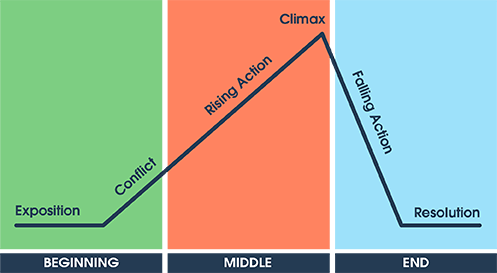Activity Overview
A common use for Storyboard That is to help students create a plot diagram of the events from a story. Not only is this a great way to teach the parts of the plot, but it reinforces major events and help students develop greater understanding of literary structures.
Students can create a storyboard capturing the narrative arc in a work with a six-cell storyboard containing the major parts of the plot diagram. For each cell, have students create a scene that follows the story in sequence using: Exposition, Conflict, Rising Action, Climax, Falling Action, and Resolution.
The Grapes of Wrath Summary Plot Diagram Example
Exposition
Tommy Joad has been paroled from prison early for good behavior. He was sent there after killing Herb Turnbull in a barfight. He arrives back to his family’s farm to find it deserted; his family has all moved to his Uncle John’s after the bank took the land. He runs into a former Reverend, Jim Casy, and his neighbor Muley Graves. He resolves to go to Uncle John’s the following morning.
Conflict
Because Tommy is out on parole, he technically cannot leave the state. However, his family is planning to move to the San Joaquin Valley of California, where a government program promises a beautiful future for displaced farmers. The entire family and Casy have to fit into a small jalopy Hudson Super-Six truck in order to travel the 2,000 miles across the country.
Rising Action
The Joads set off on Highway 66, where many others from the Great Plains areas are migrating west. Grandpa Joad has a stroke the night they leave, and dies. As the Joads drive on, they begin to hear rumblings that there aren’t enough jobs in California after all. As they continue, Noah decides to leave the group, Sairy Wilson is too sick to continue traveling with the Joads, and Granma dies.
Climax
At the Hooverville migrant camp, the Joads find corrupt police officers and hostile locals. Casy takes the blame for striking a deputy who was out of control, and is carted off to prison. The Joads move to Weedpatch, which is run by the migrants themselves. They are offered a job picking peaches and find out it’s because the regular workers are on strike. Casy is in charge. He is hit and killed by a police officer, and Tommy explodes, killing the officer.
Falling Action
The Joads move onto a cotton-picking field where Tommy hides out until his injuries are healed from the fight. The Joads share a boxcar with the Wainwrights, and Al Joad and Agnes Wainwright fall in love. After another disappointing job opportunity, Rose of Sharon goes into labor and gives birth to a stillborn baby. Tom decides to continue Casy’s work by staying behind to help the migrant workers. The boxcar is overtaken by floodwaters, so the Joads flee.
Resolution
The Joads come to a farm where they find a barn for shelter. Rose of Sharon is still very ill. Inside the barn, they find a young boy and a man, his father, who is starving from being sick and is not able to eat solid foods anymore without getting sick. Rose of Sharon gives the dying man her breast, which has milk from her recent birth, and covers him with a blanket. She is strangely at peace.
Template and Class Instructions
(These instructions are completely customizable. After clicking "Copy Activity", update the instructions on the Edit Tab of the assignment.)
Student Instructions
Create a visual plot diagram of The Grapes of Wrath.
- Separate the story into the Exposition, Conflict, Rising Action, Climax, Falling Action, and Resolution.
- Create an image that represents an important moment or set of events for each of the story components.
- Write a description of each of the steps in the plot diagram.
Lesson Plan Reference
Rubric
(You can also create your own on Quick Rubric.)
| Proficient 25 Points | Emerging 21 Points | Beginning 17 Points | Try Again 13 Points | |
|---|---|---|---|---|
| Descriptive and Visual Elements | Cells have many descriptive elements, and provide the reader with a vivid representation. | Cells have many descriptive elements, but flow of cells may have been hard to understand. | Cells have few descriptive elements, or have visuals that make the work confusing. | Cells have few or no descriptive elements. |
| Grammar/Spelling | Textables have three or fewer spelling/grammar errors. | Textables have four or fewer spelling/grammar errors. | Textables have five or fewer spelling/grammar errors. | Textables have six or more spelling/grammar errors. |
| Evidence of Effort | Work is well written and carefully thought out. Student has done both peer and teacher editing. | Work is well written and carefully thought out. Student has either teacher or peer editing, but not both. | Student has done neither peer, nor teacher editing. | Work shows no evidence of any effort. |
| Plot | All parts of the plot are included in the diagram. | All parts of the plot are included in the diagram, but one or more is confusing. | Parts of the plot are missing from the diagram, and/or some aspects of the diagram make the plot difficult to follow. | Almost all of the parts of the plot are missing from the diagram, and/or some aspects of the diagram make the plot very difficult to follow. |
Activity Overview
A common use for Storyboard That is to help students create a plot diagram of the events from a story. Not only is this a great way to teach the parts of the plot, but it reinforces major events and help students develop greater understanding of literary structures.
Students can create a storyboard capturing the narrative arc in a work with a six-cell storyboard containing the major parts of the plot diagram. For each cell, have students create a scene that follows the story in sequence using: Exposition, Conflict, Rising Action, Climax, Falling Action, and Resolution.
The Grapes of Wrath Summary Plot Diagram Example
Exposition
Tommy Joad has been paroled from prison early for good behavior. He was sent there after killing Herb Turnbull in a barfight. He arrives back to his family’s farm to find it deserted; his family has all moved to his Uncle John’s after the bank took the land. He runs into a former Reverend, Jim Casy, and his neighbor Muley Graves. He resolves to go to Uncle John’s the following morning.
Conflict
Because Tommy is out on parole, he technically cannot leave the state. However, his family is planning to move to the San Joaquin Valley of California, where a government program promises a beautiful future for displaced farmers. The entire family and Casy have to fit into a small jalopy Hudson Super-Six truck in order to travel the 2,000 miles across the country.
Rising Action
The Joads set off on Highway 66, where many others from the Great Plains areas are migrating west. Grandpa Joad has a stroke the night they leave, and dies. As the Joads drive on, they begin to hear rumblings that there aren’t enough jobs in California after all. As they continue, Noah decides to leave the group, Sairy Wilson is too sick to continue traveling with the Joads, and Granma dies.
Climax
At the Hooverville migrant camp, the Joads find corrupt police officers and hostile locals. Casy takes the blame for striking a deputy who was out of control, and is carted off to prison. The Joads move to Weedpatch, which is run by the migrants themselves. They are offered a job picking peaches and find out it’s because the regular workers are on strike. Casy is in charge. He is hit and killed by a police officer, and Tommy explodes, killing the officer.
Falling Action
The Joads move onto a cotton-picking field where Tommy hides out until his injuries are healed from the fight. The Joads share a boxcar with the Wainwrights, and Al Joad and Agnes Wainwright fall in love. After another disappointing job opportunity, Rose of Sharon goes into labor and gives birth to a stillborn baby. Tom decides to continue Casy’s work by staying behind to help the migrant workers. The boxcar is overtaken by floodwaters, so the Joads flee.
Resolution
The Joads come to a farm where they find a barn for shelter. Rose of Sharon is still very ill. Inside the barn, they find a young boy and a man, his father, who is starving from being sick and is not able to eat solid foods anymore without getting sick. Rose of Sharon gives the dying man her breast, which has milk from her recent birth, and covers him with a blanket. She is strangely at peace.
Template and Class Instructions
(These instructions are completely customizable. After clicking "Copy Activity", update the instructions on the Edit Tab of the assignment.)
Student Instructions
Create a visual plot diagram of The Grapes of Wrath.
- Separate the story into the Exposition, Conflict, Rising Action, Climax, Falling Action, and Resolution.
- Create an image that represents an important moment or set of events for each of the story components.
- Write a description of each of the steps in the plot diagram.
Lesson Plan Reference
Rubric
(You can also create your own on Quick Rubric.)
| Proficient 25 Points | Emerging 21 Points | Beginning 17 Points | Try Again 13 Points | |
|---|---|---|---|---|
| Descriptive and Visual Elements | Cells have many descriptive elements, and provide the reader with a vivid representation. | Cells have many descriptive elements, but flow of cells may have been hard to understand. | Cells have few descriptive elements, or have visuals that make the work confusing. | Cells have few or no descriptive elements. |
| Grammar/Spelling | Textables have three or fewer spelling/grammar errors. | Textables have four or fewer spelling/grammar errors. | Textables have five or fewer spelling/grammar errors. | Textables have six or more spelling/grammar errors. |
| Evidence of Effort | Work is well written and carefully thought out. Student has done both peer and teacher editing. | Work is well written and carefully thought out. Student has either teacher or peer editing, but not both. | Student has done neither peer, nor teacher editing. | Work shows no evidence of any effort. |
| Plot | All parts of the plot are included in the diagram. | All parts of the plot are included in the diagram, but one or more is confusing. | Parts of the plot are missing from the diagram, and/or some aspects of the diagram make the plot difficult to follow. | Almost all of the parts of the plot are missing from the diagram, and/or some aspects of the diagram make the plot very difficult to follow. |
More Storyboard That Activities
Grapes of Wrath
Pricing for Schools & Districts
© 2024 - Clever Prototypes, LLC - All rights reserved.
StoryboardThat is a trademark of Clever Prototypes, LLC, and Registered in U.S. Patent and Trademark Office











